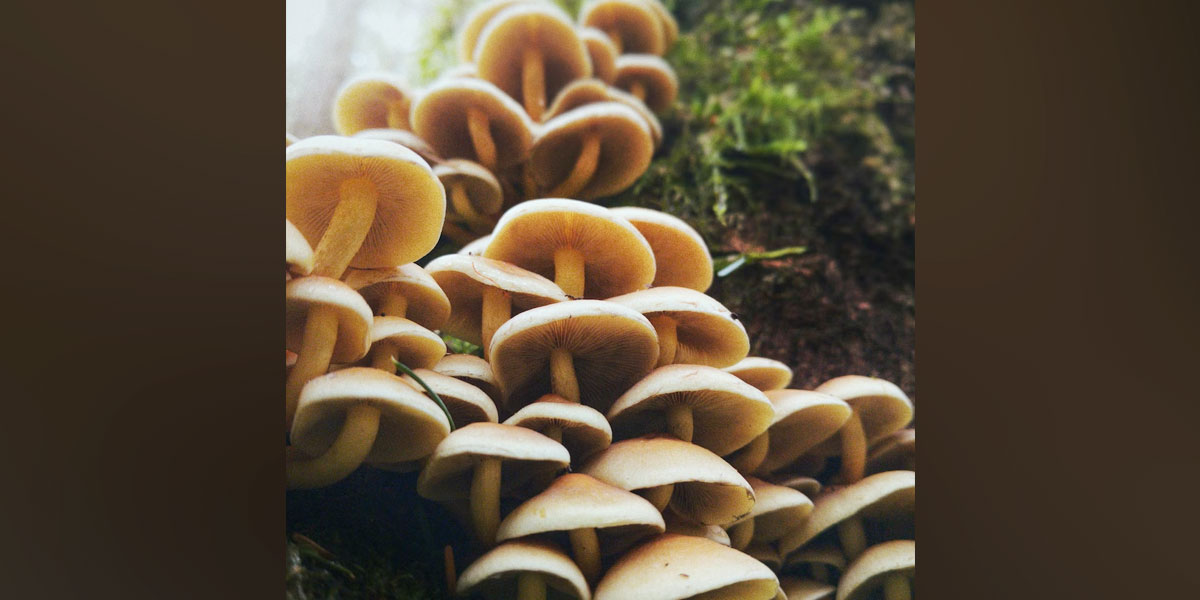The harvest that Underground Forest displays on its stand at the Tuscaloosa River Market is colorful, with soft blues, golden yellows, bright pinks, bony whites, dusky grays, and mottled browns.
But food from the urban farm is neither vegetable nor animal. Business partners Martin Blair and Jose Izaguirre grow mushrooms on their subterranean farm inside a historic building in the heart of downtown Tuscaloosa.
Underground Forest has been producing exotic fungi for a year. Most are culinary varieties like oyster, beech, chestnut, king trumpet, and enoki that are sold to chefs at high-end restaurants in Tuscaloosa and Jefferson counties.
One restaurant client even buys Underground Forest mushrooms to eat at home and share with family, Blair says.
The farm also produces varieties like reishi that customers consume for health purposes. Some, like the distinctive white lion’s mane mushroom, have both culinary and medicinal uses.
Izaguirre grows the mushrooms in the basement of a 200-year-old building across University Boulevard from Tuscaloosa City Hall. Now yielding more than 150 pounds per week, the partners plan to quadruple the output this year by bringing on more growing chambers, says Blair, who handles sales and other public-facing roles.
The mushrooms have been well-received. “The restaurants that gravitate toward us like to challenge the status quo,” he says. “They are experimental, unique. They have attitude in their cooking.”
Restaurants like River in Tuscaloosa and Automatic Seafood and Oysters in Birmingham have used Underground Forest mushrooms as a meat substitute in a barbecued slider, cut them into “scallops” to pan-fry, or roasted as an entrée with spinach, pickled ramps, pine nuts, and verde sauce.
“The creativity these guys bring to it is amazing,” Blair says. “It’s beautiful.”
Underground Forest uses a two-step growing process, in environments that are carefully controlled for temperature, humidity, carbon dioxide levels, and light.
It starts with introducing mushroom spores to a growing medium and building the mycelium, the main part of a mushroom that remains underground. This step takes up to three weeks for most varieties. Some require longer, like shiitake (12 weeks) and maitake clusters (10 weeks).
Once fully incubated, the bags are moved to a growing chamber, where they are placed and cut open to make room for the mushrooms to fruit above the surface. Oyster mushrooms are ready to harvest after a week. Slower growers like chestnut and beech varieties need up to three weeks.
The intensity of light from the grow lamps affects the tint of mature oyster mushrooms, named for their shell-like shape. The colors, however, fade during cooking.
Izaguirre and Blair are testing other culinary varieties for their commercial potential, including the popular maitake, also known as hen of the woods.
Black pearl mushrooms, an ebony-colored cross with the firm body of a king trumpet and the head of an oyster, are Underground Forest’s latest addition to its lineup.
Unusual-looking but versatile, the lion’s mane variety has become a favorite among chefs searching for meat-free options for customers, including vegetarians and vegans.
The bulbous, white mushroom is firm, with a stringy texture that mimics meat like pulled pork shoulder. It’s a flavor sponge when cooked, whether in garlic and butter or a spicy crawfish boil, Blair says.
Blair and Izaguirre also favor lion’s mane in their own kitchens.
“I like it in ‘crab’ cakes, dips, and to make ‘chicken’ nuggets for my six-year-old,” Izaguirre says. “I love enokis for fried rice. Chestnuts are great for steak and chicken. I love making alfredo sauce with king oyster fried up with bacon.”
An increasing number of mushroom growers, some of whom also forage for wild varieties like chanterelles, are plying their products these days at several pop-up famers markets.
In addition to the Tuscaloosa River market, Underground Forest also sells on Saturday mornings at Birmingham’s Birdsong Farmers Markets outside Automatic restaurant. The partners hope to expand to the Brock’s Gap farmers market in Hoover.













